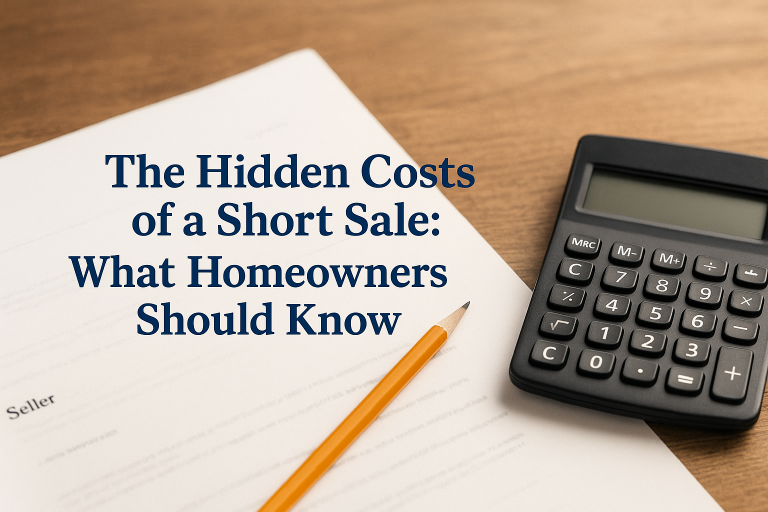A short sale negotiator bridges the gap between homeowners, lenders, and agents—making sure every step of the process moves forward smoothly. Learn how their expertise can make or break a successful short sale.


A short sale negotiator bridges the gap between homeowners, lenders, and agents—making sure every step of the process moves forward smoothly. Learn how their expertise can make or break a successful short sale.

As housing affordability challenges continue into 2025, short sales are re-emerging as a vital niche for real estate professionals. This post explores how agents can strategically use short sales to expand their client base, strengthen relationships with lenders, and position themselves as market experts.

Short sales can help homeowners avoid foreclosure and limit credit damage, but many don’t realize there can still be unexpected costs. Here’s what to expect and how to prepare for them before starting the process.

A short sale can be a smart way to avoid foreclosure and move forward financially — but only if handled correctly. Here are the five most common mistakes homeowners make during a short sale and how to prevent them from derailing your success.

Qualifying for a short sale can feel overwhelming, but knowing what lenders look for can make the process smoother. This guide breaks down the key factors banks and lenders consider when approving a short sale, helping homeowners prepare for success.

Many homeowners worry that going through a short sale means they’ll never own a home again. The good news is that buying another home is possible—often sooner than you think. This article breaks down timelines, loan requirements, and steps to prepare for homeownership after a short sale.

Understanding the Basics
Foreclosure is the legal process where a lender takes back a property when the homeowner can no longer make mortgage payments. It’s stressful, damaging to credit, and can feel impossible to escape. A short sale offers an alternative path, where the lender agrees to let you sell your home for less than what you owe on the mortgage.
For homeowners, a short sale often means:
> Avoiding foreclosure on their record.
> Reducing damage to credit compared to foreclosure.
> Moving forward with fewer financial repercussions.
> You can learn more about the differences here: Short Sale vs Foreclosure Page
How a Short Sale Can Stop Foreclosure
If your home is already in foreclosure proceedings, you may still have time to act. In most cases, lenders prefer a short sale over a foreclosure because it:
> Reduces the cost and time involved in foreclosure.
> Allows the lender to recover more of the loan balance.
> Keeps the property in better condition than if it sat vacant.
As long as you’re still in the pre-foreclosure stage, starting a short sale can halt the foreclosure process. The lender must approve the short sale, but once they agree, the foreclosure is usually paused while the sale is underway.
Steps to Pursue a Short Sale Before Foreclosure
If you’re considering a short sale to stop foreclosure, here’s what typically happens:
Contact your lender early – The sooner you explain your financial hardship, the more likely they’ll consider a short sale.
Prepare a hardship letter – Lenders need to understand why you can’t keep up with payments.
Work with a short sale expert – A professional who knows the process can save time and improve your chances of approval.
List your home for sale – Usually through an agent experienced in short sales.
Submit offers for lender approval – The lender must approve the final sale price before closing.
For a step-by-step breakdown, visit our Stages of a Short Sale page
Benefits of Choosing a Short Sale Over Foreclosure
While neither option is ideal, a short sale generally provides:
> Less credit damage than foreclosure.
> Faster financial recovery for homeowners.
> Potential relocation assistance from some lenders.
More details are available here: Credit Impact of a Short Sale
When Foreclosure Cannot Be Stopped
It’s important to note that a short sale isn’t always possible. If the foreclosure sale date is already scheduled and very close, or if the lender refuses to approve the short sale, foreclosure may proceed. Acting early gives you the best chance of success.
For personalized help, you can connect with us through our Homeowners Page
Final Thoughts
A short sale can often stop foreclosure in its tracks, but timing is everything. If you’re facing missed mortgage payments and foreclosure notices, exploring a short sale right away may give you a smoother financial future.
For official information on foreclosure rights, visit: https://www.consumerfinance.gov/

Many homeowners considering a short sale wonder how it will affect their taxes. While short sales can relieve financial stress, they may also come with potential tax consequences. This post breaks down what homeowners should know about short sale tax implications and how to prepare for them.

When homeowners face foreclosure, they often become targets for scammers promising quick fixes. This post explains the most common foreclosure and short sale scams, how to recognize them, and the safe steps homeowners can take to protect themselves.

Short sales are often misunderstood, leaving homeowners unsure about their options. This post clears up common myths about short sales so you can make informed decisions and avoid foreclosure.
No matter where you're located in America
we can help you, too!
(800) 704-6411
hello@shortsale.co